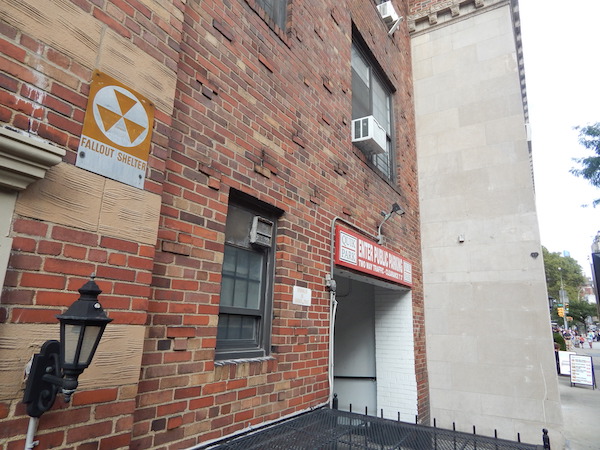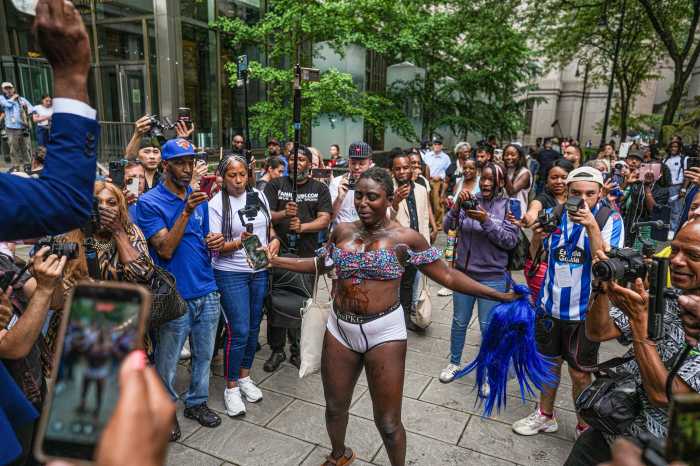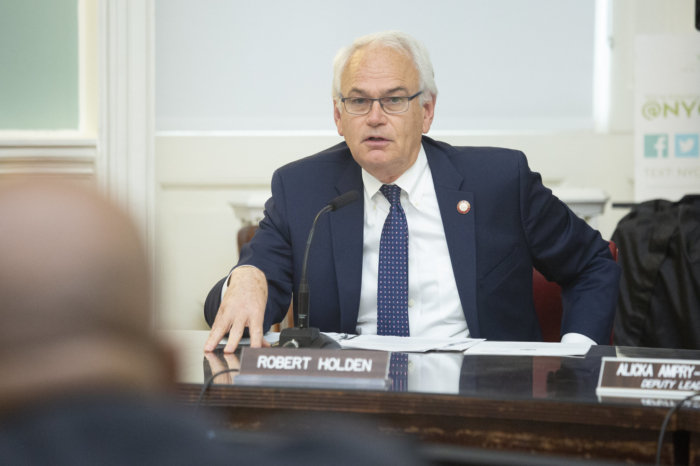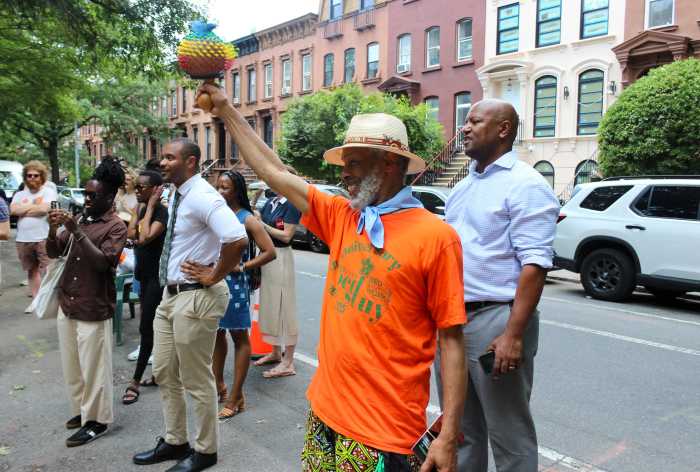
BY MANNY MARTIN | I am back at Chelsea Square Restaurant (at Ninth Ave. and W. 23rd St.) for some nourishment, and to collect my thoughts about “early Chelsea.” Who will be my server today: George, Herman, or Pedro? George seats me. As is our habit, we have a brief exchange about the political highlights of the day. The subject du jour, the escalating tensions between North Korea and the US, causes me to remember what it was like to grow up during a time of innocence when Chelsea, and the country, found itself adapting to the concerns of the Cold War between the US and the Soviet Union.
Long before there were iPads, smartphones and laptops, many readers will remember what now seems like primitive technology: record players, transistor radios, and black and white TVs. The popular comic strip depiction of crime-fighting Dick Tracy talking into his two way wrist-radio was a whisper of things to come.
It was the 1950s — a period of societal puberty accompanied by new and confusing, in some ways alarming, cultural changes. In Chelsea, kids played street stickball and stoopball. It was the beginning of rock and roll, loved by teens and regarded with suspicion by most adults. Teens were beginning their own subculture of music, clothes, and values. Adults were being challenged openly now. On a national scale, there were important challenges to the status quo, mainly in the area of civil rights. Television was taking on a life of its own, becoming a “babysitter” to many people who spent too much time watching.
The western programs had no sex and little violence. When there was fisticuffs between the good guy and bad guy, no one got hurt, just egos. The bad guys often got shot in the wrist, and the cowboy never kissed the girl. The popular cowboys, Hoppy, Roy, and Gene caught the bad guys (for readers too young to remember, that’s Hopalong Cassidy, Roy Rogers, and Gene Autry). Early TV cowgirl Annie Oakley was a feminist ahead of her time who could hold her own with any man, and opened her weekly program shooting her gun standing on her horse as it galloped away. What’s not to like?
Popular sitcoms like “Father Knows Best” and “The Life of Riley” were virtual commercials for suburban living, which beckoned city residents to a land of new joys and happiness. In the suburbs, lawns were immaculately maintained, every back yard had a barbeque grill, and neighborhoods were free of crime. Every problem was solved by dad within the program’s half-hour — and a woman’s place was in the home, as a homemaker.
Shows like “The $64,000 Question” and “Twenty One” were very popular. The age of innocence was severely strained by the quiz show scandal in which top contestants were given the answers to difficult, multi-part questions and were even tutored in how to build suspense with body language before giving answers. The temperature in the “isolation booths” that isolated contestants from sounds and distractions was turned up to make contestants sweat, which added to the tension each week. The scandal was part of a rude wake-up of 1950s innocence.
Looming above it all, new fears grew as the Cold War between the US and the USSR took center stage. As some readers will recall, the Cold War was the tense relationship between both countries for nearly 50 years, ending in 1991 with the dissolution of the USSR. The major threat of the Cold War was the possibility of nuclear annihilation. There was a fear of Communist infiltration in the US government, entertainment industry, and corporations. This all led to new policies to contain the threat of communism in the US while preparing for a nuclear attack.
This writer lived in Chelsea as a child at the time and was required to follow certain practices and drills. At what was then PS 33, between W. 26th and 27th Sts. on Ninth Ave. (now Chelsea Prep), the teacher would stop teaching and, in a stern voice, shout out, “Duck and cover!” That meant that all students had to quickly go under their desks, with hands covering their heads. The blinds or curtains were all closed during the drill, which lasted for about a minute.
Every student in every grade was required to wear a dog tag ID held by a metal chain. On it was imprinted the student’s name, address, age, birthday, and school. That was in case there was an attack, so every kid could be identified, survivor or not. It had to be worn at all times. Since I was tall for my age I used it to prove I was a minor who should only pay the 30-cent Saturday admission fee at the grand RKO Theater near the corner of W. 23rd St. and Eighth Ave. They never believed me, so each week so I had to run home and get my mother. She would storm to the ticket booth and demand to speak with the manager. She would battle with him every week and win, as dozens of kids watched on. I was glad when I finally got to be 13 years old.
Every Saturday about 1 p.m. there was a citywide evacuation drill. Sirens wailed and everyone had to get off the streets. There were evacuation stations marked as such, and people might also enter the subway or railroad station. Evacuation guards led people quickly to designated shelters. The drill lasted about seven or eight minutes, then the streets instantly filled again.
As a Chelsea youngster, in anticipation of the siren that would signal the evacuation drill, my brother and I would gather our best games, comic books, baseball card collections, snacks, and a stack of bologna sandwiches and “hide” under the kitchen table in a ready-made “bomb shelter.” When the second siren went off, everything had to be put back until this process was repeated the next Saturday.
Other steps were taken to fight the threat of Communism in the country. President Harry S. Truman tried to calm our fears by creating the Loyalty Review Board to verify the loyalty of government workers. They would have to sign loyalty oaths. I had to sign one myself. Television programs were interrupted by tests of the Emergency Broadcasting System — reminding viewers that “in the event of an actual emergency,” they would be told where to go.
Society grew up — and by the end of ’50s, rock and roll was in full swing as teens challenged adult authority even more. Other challenges allowed steady progress for the rights of racial minorities and the gay community. The role of women was still mainly defined as homemaker until a few years later when, in 1963, Betty Friedan’s book, “The Feminine Mystique,” rallied women across the country to seek educational and professional opportunities that were dominated by men.
Hard-earned progress could not be stopped now. The Cold War would ratchet up for decades. It was a new beginning, and the age of innocence was over! The Fifties was a real time of passage. Dear Fifties, where are you now, and what have you become? Perhaps the song “Mrs. Robinson,” written by Paul Simon and released in 1968, partly expresses it: “Where have you gone, Joe DiMaggio / Our nation turns its lonely eyes to you… Jolting Joe has left and gone away.”


































